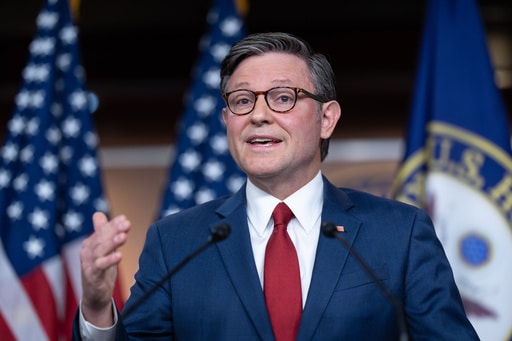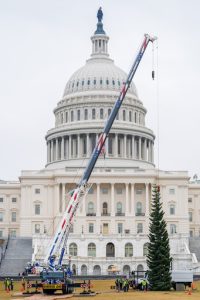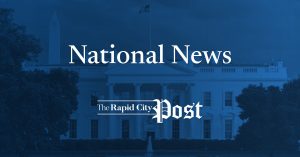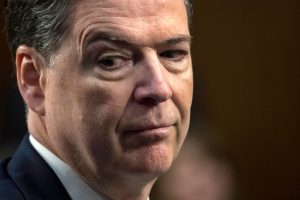WASHINGTON
By LISA MASCAROAP Congressional Correspondent
After refusing to convene the U.S. House during the government shutdown, Speaker Mike Johnson is recalling lawmakers back into session. They are set to consider the bill to reopen the federal government on Wednesday. As hundreds of lawmakers return they are bringing pent-up legislative demands after nearly two months away. There are calls to release the Jeffrey Epstein files and swear-in Arizona’s Rep.-elect Adelita Grijalva, who won her special election back in September. It’s all a test of the speaker’s leadership and shows the ways he has amassed power alongside President Donald Trump.
WASHINGTON (AP) — After refusing to convene the U.S. House during the government shutdown, Speaker Mike Johnson is recalling lawmakers back into session — and facing an avalanche of pent-up legislative demands from those who have largely been sidelined from governing.
Hundreds of representatives are preparing to return Wednesday to Washington after a nearly eight-week absence, carrying a torrent of ideas, proposals and frustrations over work that has stalled when the Republican speaker shuttered the House doors nearly two months ago.
First will be a vote to reopen the government. But that’s just the start. With efforts to release the Jeffrey Epstein files and the swearing in of Arizona's Rep.-elect Adelita Grijalva, the unfinished business will pose a fresh test to Johnson’s grip on power and put a renewed focus on his leadership.
“It’s extraordinary,” said Matthew Green, a professor at the politics department at The Catholic University of America.
“What Speaker Johnson and Republicans are doing, you have to go back decades to find an example where the House — either chamber — decided not to meet.”
When the House gavels back into session, it will close this remarkable chapter of Johnson’s tenure when he showed himself to be a leader who is quietly, but brazenly, willing to upend institutional norms in pursuit of his broader strategy, even at the risk of diminishing the House itself.
Rather than use the immense powers of the speaker’s office to forcefully steer the debate in Congress, as a coequal branch of the government on par with the executive and the courts, Johnson simply closed up shop — allowing the House to become unusually deferential, particularly to President Donald Trump.
Over these past weeks, the chamber has sidestepped its basic responsibilities, from passing routine legislation to conducting oversight. The silencing of the speaker's gavel has been both unusual and surprising in a system of government where the founders envisioned the branches would vigorously protect their institutional prerogatives.
“You can see it is pretty empty around here,” Johnson, R-La., said on day three of the shutdown, tour groups no longer crowding the halls.
“When Congress decides to turn off the lights, it shifts the authority to the executive branch. That is how it works,” he said, blaming Democrats, with their fight over health care funds, for the closures.
The speaker has defended his decision to shutter the House during what’s now the longest government shutdown in U.S. history. He argued that the chamber, under the GOP majority, had already done its job passing a stopgap funding bill in September. It would be up to the Senate to act, he said.
When the Senate failed over and over to advance the House bill, more than a dozen times, he refused to enter talks with the other leaders on a compromise. Johnson also encouraged Trump to cancel an initial sit-down with the Democratic leaders Sen. Chuck Schumer and Rep. Hakeem Jeffries to avoid a broader negotiation while the government was still closed.
Instead, the speaker, whose job is outlined in the Constitution, second in line of succession to the presidency, held held almost daily press conferences on his side of the Capitol, a weekly conference call with GOP lawmakers, and private talks with Trump. He joined the president for Sunday's NFL Washington Commanders game as the Senate was slogging through a weekend session.
“People say, why aren't you negotiating with Schumer and Jeffries? I quite literally have nothing to negotiate,” Johnson said at one point.
“As I’ve said time and time again, I don't have anything to negotiate with," he said on day 13 of the shutdown. “We did our job. We had that vote."
And besides he said of the GOP lawmakers, “They are doing some of their best work in the district, helping their constituents navigate this crisis.”
In many ways, Johnson has become a surprisingly effective leader, an accidental speaker who was elected to the job by his colleagues after all others failed to win it. He has now lasted more than two years, longer than many once envisioned.
This year, with Trump’s return to the White House, the speaker has commandeered his slim GOP majority and passed legislation including the president's so-called “one big beautiful bill” of tax breaks and spending reductions that became law this summer.
Johnson's shutdown strategy also largely achieved his goal, forcing Senate Democrats to break ranks and approve the funds to reopen government without the extension of health care subsidies they were demanding to help ease the sticker shock of rising insurance premium costs with the Affordable Care Act.
Johnson's approach is seen as one that manages up — he stays close to Trump and says they speak often — and also hammers down, imposing a rigid control over the day-to-day schedule of the House, and its lawmakers.
Under a House rules change this year, Johnson was able to keep the chamber shuttered indefinitely on his own, without the usual required vote. This year his leadership team has allowed fewer opportunities for amendments on legislation, according to a recent tally. Other changes have curtailed the House's ability to provide a robust check on the executive branch over Trump's tariffs and use of war powers.
Johnson's refusal to swear-in Grijalva is a remarkable flex of the speaker's power, leading to comparisons with Senate GOP Leader Mitch McConnell's decision not to consider President Barack Obama's Supreme Court nominee, said David Rapallo, an associate professor and director of the Federal Legislation Clinic at Georgetown University Law Center. Arizona has sued to seat her.
Marc Short, who headed up the White House’s legislative affairs office during the first Trump administration, said of Johnson, “It’s impressive how he’s held the conference together.”
But said Short, “The legislative branch has abdicated a lot of responsibility to the executive under his watch.”
As lawmakers make their way back to Washington, the speaker's power will be tested again as they consider the package to reopen government.
Republicans are certain to have complaints about the bill, which funds much of the federal government through Jan. 30 and keeps certain programs including agriculture, military construction and veterans affairs running through September.
But with House Democratic leaders rejecting the package for having failed to address the health care subsidies, it will be up to Johnson to muscle it through with mostly GOP lawmakers — with hardly any room for defections in the chamber that's narrowly split.
Jeffries, who has criticized House Republicans for what he called an extended vacation, said, “They’re not going to be able to hide this week when they return."





